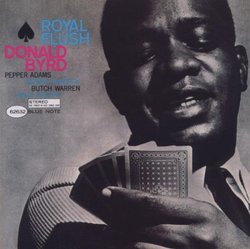| All Artists: Donald Byrd Title: Royal Flush Members Wishing: 0 Total Copies: 0 Label: Blue Note Records Original Release Date: 1/1/2006 Re-Release Date: 8/15/2006 Genres: Jazz, Pop, R&B Styles: Bebop, Funk Number of Discs: 1 SwapaCD Credits: 1 UPC: 094636263229 |
Search - Donald Byrd :: Royal Flush
 | Donald Byrd Royal Flush Genres: Jazz, Pop, R&B
|
Larger Image |
CD Details |
CD ReviewsDonald Byrd's Winning Hand Michael B. Richman | Portland, Maine USA | 08/24/2006 (5 out of 5 stars) "After years of pleading by many a jazz fan, Donald Byrd's "Royal Flush" finally has been released as a domestic CD in the RVG Series. (Thankfully it has also been available for some time in the 6CD Mosaic set "The Complete Blue Note Donald Byrd/Pepper Adams Studio Sessions.") This September 21, 1961 session has to be considered the trumpeter's best Blue Note album. Not only does it feature six standout, classic post bop tracks, impeccably performed by Byrd and his musical soulmate, the bartione saxophonist Pepper Adams (What a glorious sound they make together!), but it is also a jazz landmark for several important reasons. "Royal Flush" is the first Blue Note album to feature the magical rhythm duo of Butch Warren on bass and Billy Higgins on drums, a pair that would go on to provide the backbone of famous records by Dexter Gordon, Sonny Clark, Jackie McLean, and Herbie Hancock among others. And speaking of Hancock, "Royal Flush" was the legendary pianist's first Blue Note session to be released, and it contains his first recorded composition, "Requiem." In all, don't fold on this one -- "Royal Flush" is a winning hand and a jazz classic!" Menage a trois Samuel Chell | Kenosha,, WI United States | 09/08/2006 (5 out of 5 stars) "Don't buy this recent RVG remaster because it's Herbie Hancock's first recording session (who looks all of 14 in the photo though he was 21 at the time). Pick it up because, as Michael Richmond suggests in the previous review, "Royal Flush" is a winning hand by Byrd, possibly his best ever. Should proof be required, listen to the trumpeter's performance of "I'm a Fool to Want You," the song often said to be Sinatra's most moving performance thanks to the influence of Ava Gardner. She must have had the same impact on Donald Byrd, who turns in the instrumental equivalent of Sinatra's reading, right down to Old Blue's "breathless" phrasing. The trumpeter takes the song once through, demonstrating both extraordinary technique and sensitive musicianship when he employs circular breathing in the bridge, extending the two most important notes of the song until time itself is suspended. As for Hancock, there's nothing about his playing to suggest he's anything other than a seasoned pro on what was, in fact, his actual "maiden voyage." On the opener, "Hush," he summons up a Ramsey Lewis gospel feel; his solo on "Jorgie's" could have been played by Bill Evans; on the modal "Shangri-La" (not the familiar pop hit) he evokes the voicings and melodic patterns of McCoy Tyner. And contrary to expectations, there's never the slightest hint of "overplaying." In some respects, I wish I could give the recording four and one-half because the last two tunes are anti-climactic: Byrd's "6 M's" is another laid-back blues in C (at least in 3/4 this time), and Herbie's "Requiem" is too close to "Shangri-La" in modality and tempo. One up-tempo number with ample blowing time for Pepper Adams would certainly have done the trick. On the other hand, the most enduring and perpetually fresh jazz recording ever made--"Kind of Blue"--has no fast tunes. What's the difference? I know you're going to say Miles, Coltrane, and Bill Evans, but I don't think that's it. Instead, imagine what "Kind of Blue" would have sounded like (most pointedly Bill's piano) if recorded by Van Gelder." THE QUINTET! Brian D. Fitzpatrick | Medford, MA | 05/17/2007 (5 out of 5 stars) "[Donald Bryd Quintet]
Donald Bryd-trumpet Pepper Adams-Baritone Butch Warren-bass Herbie Hancock-piano Billy Higgins-drums TUNES Hush(Donald Byrd) I'm A Fool To Want You(Wolf-Heron-Sinatra) Jorgie's(Donald Byrd) Shangri-La(Donald Byrd) 6M's(Donald Byrd) Requiem(Herbie Hancock) Donald Byrd's recordings for Blue Note have always remained of the highest calibre.Bryd is a superb composer,as is well documented in his contributions for this session,and is very shrewd and inventive in picking and choosing the players for his recordings as a leader.It makes a difference!Donald Byrd amoungst a select group of great trumpet players that rose in the ranks beggining in the late 50's.There were many,to name a few,Lee Morgan,Johnny Coles,Wilbur Harden,Miles,'Brownie',Kenny Dorham,Blue Mitchell,et al. Four of the six tunes on 'Royal Flush'come from Bryd's pen.Pepper and Donald,who have a long history of playing together, are the 'front lines'for this session.Pepper Adams,Herbie,and Donald contribute great solos throughout.On 'I'm a Fool to Want You'(Wolf-Herron-Sinatra),Byrd's rendition is superb.His tone and excecution create this ethereal mist.It's like the tune is way inside him for a visit.As Dexter Gordon pointed out somewhere,the importance of knowing the lyrics to the tunes.It changes your whole perspective,whether listening or playing. Some great originals by Bryd,and great playing all around.The quintet as a whole really sparkles on Shangra-La,great soloing all around.It is very difficult to swing hard at slow tempos.These guys cut through it like 'soft butter'.A great rhythm section,Herbie,Warren,and Billy provide finesse support for Pepper and Donald.This comes highly reccomended. Health and Happiness.Enjoy* " |

 Track Listings (6) - Disc #1
Track Listings (6) - Disc #1